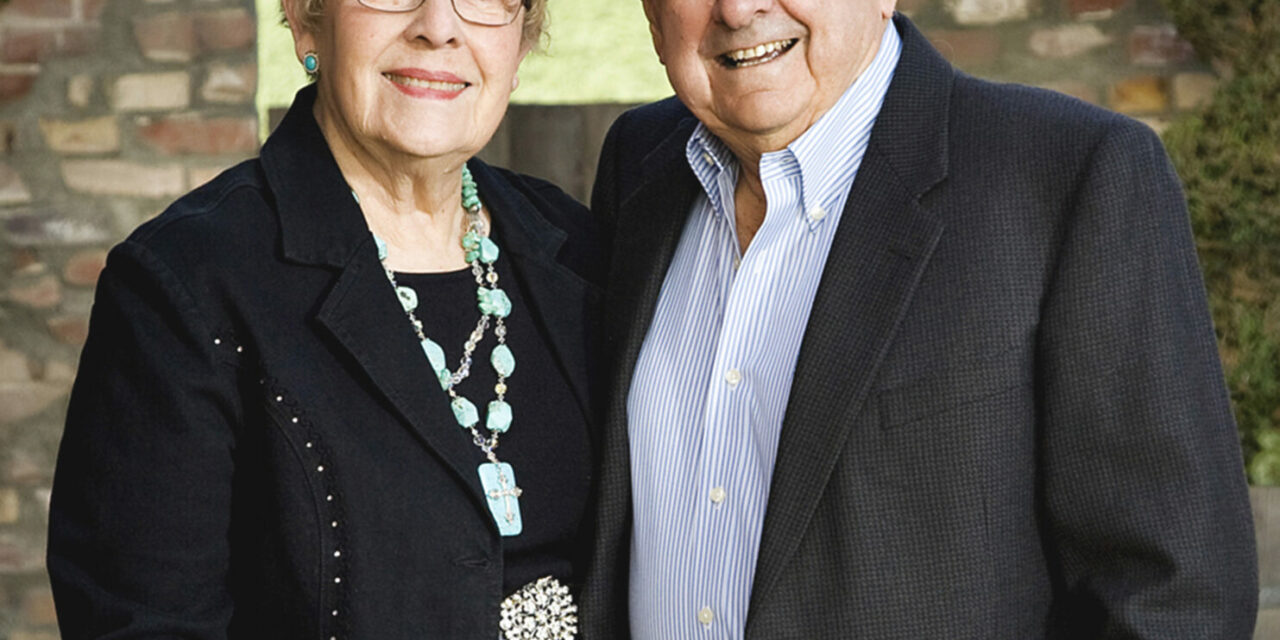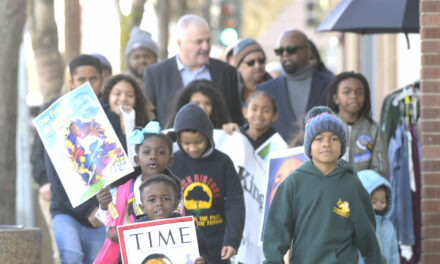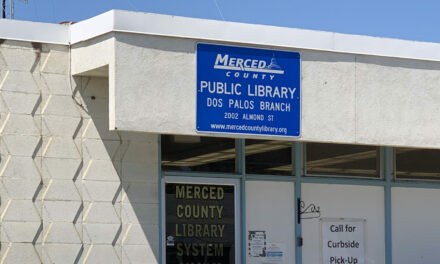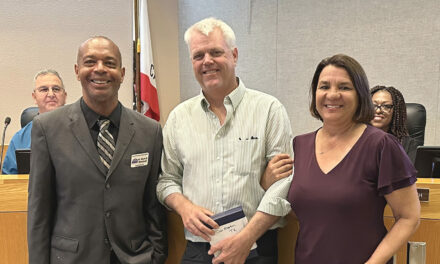(Editor’s note: In remembrance of Aldo Sansoni, who passed away Aug. 23, and his wife Virginia, who passed away in 2020, The Westside Express is printing a story written by John Spevak in 2009.)
They met when they were kids, because their families were good friends. They started to notice each other in high school. They were engaged for four years, while he was in the Navy. Their wedding night in 1955 — when he was 24 and she was 22 — was their first date.
Virginia and Aldo Sansoni had an improbable courtship that turned into a remarkable marriage, still going strong 54 years later as together they continue to lead Delta Farms, one of the most successful farming operations in and around Los Banos.
“We were destined to marry,” Aldo said. “But it wouldn’t be easy. “I had a very strict mother.”
“And I,” Virginia said, “had a very strict father.
Some people may have noticed destiny when Virginia and Aldo were in high school. Virginia Bisignani was first a majorette for Los Banos High, then the band’s drum major. Aldo Sansoni played the coronet for Merced High. They saw each other at every event that included the two high school bands, including the big Los Banos May Day Parade.
They talked in groups and across tables when their families got together, which was often. They felt an attraction to each other in high school, a chemistry. But they never dated.
“Oh, no,” said Virginia. “Neither my dad nor Aldo’s mom would have allowed either of us to date in high school.”
“But it had to be destiny that we would connect,” Aldo said, “a destiny which goes back to Italy, from which our parents emigrated, through Sanger, Livingston, Ukiah, and finally Los Banos.”
Families emigrating from Italy
In 1920 Aniceto Sansoni left the province of Tuscany in northern Italy for America, ending up in Sanger, CA, where other Italians were living and working. Two years later he convinced his longtime sweetheart, Amelia Allegranzzi, to leave her small hometown in Italy to join him.
In 1926 John Bisignani, whose given name was Francesco Giovanni, left southern Italy for America, also ending up in Sanger, working for the same large farming operation that employed Aniceto Sansoni. By chance (or fate) John Bisignani and Aniceto Sansoni became friends.
Their friendship continued when they both moved to the Livingston area, where work was available in the Cressey vineyards. It was there, too, that John Bisignani met and married Louise Mesa.
The Sansoni-Bisignani friendship continued even when Bisignani moved to Ukiah to work on the Ridgewood Ranch, the property of Charlie Howard, owner of the race horse Seabiscuit. Bisignani was Howard’s personal cook and worked on the ranch when Seabiscuit was retired there.
A goat for baby Aldo
Their friendship was so strong that when Aniceto and Amelia’s son Aldo was born on Aug. 30, 1931 (in Merced’s Mercy Hospital) and had a severe case of eczema, John put a goat in the rumble seat of his Model-A Ford, drove from Ukiah to Cressey, gave the goat to the Sansonis, and said, “Have Aldo drink goat’s milk.” Aldo did, and it helped calm the eczema.
Two years later, Louise Bisignani gave birth to a daughter, Virginia, in Merced’s Mercy Hospital.
In 1935, with the Central Valley and all of America still in the midst of the Depression, John decided to move his family to what is now Delta Farms, near Los Banos, where his older brother Pasquale was the general superintendent of 35,000 acres of land owned by Miller and Lux.
Pasquale Bisignani in Los Banos
Pasquale was 17 years older than John and had accomplished a lot. He had landed in Los Banos after emigrating from Italy to Sao Paolo, Brazil, working there as a shoemaker and carpenter as young man, and then moving to the United States.
Pasquale was welcomed into the Italian-American community in Los Banos in 1903 by J. L. Toscano, who met Pasquale at the town’s railroad station. Pasquale started as a stable boy for Miller and Lux, and before long became Henry Miller’s personal stable boy whenever Miller was in the Los Banos area.
Both Pasquale and John saved as much money from their paychecks as they could. Pasquale gradually saved enough to buy some land near what is now Delta Farms and with the money that John sent, bought some land for his brother. By the time John arrived, the Bisignani brothers had small farms of their own and bought cattle to raise there.
Meanwhile, the Sansonis had moved closer to Merced, and Aldo was attending a country grammar school in the Franklin area. Virginia Bisignani was going to school at Los Banos Elementary.
During this time the Sansonis and Bisignanis would gather as families once a month at one of the families’ homes. Along with the other kids (Aldo has two brothers, Henry and Ezio; Virginia has one sister, Mary) Aldo and Virginia might talk in groups or across a table. “But we didn’t particularly pay any attention to each other,” Virginia said.
High School
Then they started high school, Aldo at Merced High in 1946 and Virginia at Los Banos High in 1948. During his sophomore year, however, Aldo went to school at St. Mary’s Preparatory High School in Oakland. “My mother was determined I would go to college,” Aldo said. “But my grades in my freshmen year weren’t stellar.
“Through a priest-friend, she enrolled me at St. Mary’s, where I lived in a dormitory and took the regular sophomore classes during the day. In the early mornings and evenings, I was tutored by Brother Edwards in the freshmen subjects that I had done poorly in at Merced High. In that one year I completed two grades of school work.”
Aldo would have continued at St. Mary’s, but his dad became ill, and the family thought it would be better for him to come back to the ranch and help out.
As a junior at Merced High he returned to the band, in which he had played his coronet as a freshman. Meanwhile, Virginia, then a freshman, was a majorette for the Los Banos High band; later, she became a renowned drum major under band director Don Williams. Music gradually brought them together. These two teenagers, who had talked a little at family gatherings, started to notice each other at reviews and parades.
“I thought Virginia was attractive,” Aldo said, “and I knew she was a polite girl from a good family.”
“I thought Aldo was kind of cute,” Virginia said, “and from being around him I knew he was courteous and kind.”
But they never dated. Neither Virginia’s father nor Aldo’s mother would allow anything of that sort. So they had to be content with writing letters to each other and talking when their families gathered.
Into the Navy
After Aldo graduated from Merced High, he was set to go on to college and fulfill his mother’s dream. But the Korean War was being fought, and the draft was in force. “I knew I didn’t want to be drafted into the army,” Aldo said, “so I enlisted in the Navy, with its four-year commitment.”
He went to San Diego for basic training. After finishing training and before being sent to Hawaii to await orders, Aldo went to John Bisignani and asked his permission to propose to his daughter and marry her.
“You can get engaged,” Aldo remembers John saying, “but no service man is going to marry my daughter. I don’t want her becoming a war bride and maybe a war widow. You’ll have to wait to get married until you’re out of the service.”
Virginia accepted Aldo’s proposal, they were engaged, and then he was off to Hawaii, ready to be shipped to Korea. But throughout all this, Aldo and Virginia still hadn’t gone on a date.
Hawaii, not Korea
In Hawaii, Aldo’s orders were lost for several weeks. By the time they were found, the Navy wasn’t quite sure what to do with him.
“Eventually, a naval officer took me aside and said, ‘Looking at your background, I think you’re a good fit for naval supplies. So he assigned me to supplies in Hawaii, and I stayed there for three years.”
While he was in Hawaii, his commanding officer, Lt. Andrew Dowd, noticed that Aldo was a bright, reliable, hard working seaman and took him under his wing. When Aldo’s three-year Hawaii assignment was up, Lt. Dowd offered Aldo the opportunity to be the personal driver for Admiral Dowd, the lieutenant’s father, for the last year of Aldo’s four-year commitment.
Aldo was ready to agree until he discovered that part of his job would be taking care of the two French poodles the admiral’s wife owned. “I told the lieutenant no,” Aldo said. “I thought I was too much of a man to be parading a couple of poodles around the base.”
So Aldo would be given another assignment. He was hoping it would be stateside, so he could be closer to Virginia. But instead he was assigned to the U.S. Ajax, a maintenance and repair ship headed for Japan. His assignment enabled him to visit several Japanese cities. In one city he visited an Italian restaurant named Aldo’s and found on the wall a signed photo of Los Banos resident Rocco Pernetti.
Then, in 1954, the Ajax was sent to French Indochina (later referred to as Viet Nam), where the French were starting to pull out and Americans were starting to get more involved. Aldo was assigned to be an interpreter between the Italian regiment of the French Foreign Legion and American commanders.
“One of the Italian officers pulled me aside,” Aldo said, “and asked me, ‘Do you Americans know what you’re getting yourselves into? This is a war which can’t be won.’”
Their first date—on their wedding night
In Jan. 1955 Aldo was discharged from the Navy and headed straight for Los Banos, where Virginia was waiting. She had been attending Fresno City College, living with a cousin in Fresno during the week and coming home each weekend.
Virginia and Aldo set the wedding date for the following month. She was now 22 and he was 24. In the month prior to the wedding, Aldo would visit Virginia at her home, but always with her dad or another family member present. They would go to the Crest Theater in Los Banos to see a movie, but always accompanied by someone from the Bisignani family.
Virginia and Aldo were married on Feb. 20, 1955. And on their wedding night, they finally had their first date all to themselves.
A farming opportunity
Now Aldo was ready to fulfill his mother’s desire and go to college. He had been admitted to St. Mary’s in Moraga, starting in the fall. In the meantime Virginia’s father John and her uncle Pasquale, whom she and Aldo called Uncle Pat, offered Aldo a job on the Bisignani farm while he waited for classes to begin.
John and Uncle Pat liked Aldo and his strong work ethic so much that they offered him an opportunity to play a greater role on their ranch and to become a part of the Bisignani team. “The opportunity was so appealing,” Also said, “that I decided to stay on rather than go to college.”
It wasn’t an easy or pleasant job for Aldo. “My father-in-law didn’t believe in compliments or appreciation,” Aldo said. “I worked long hours and did everything he asked and beyond, but he never once said, ‘Good job’ or “Thank you.’ After a while, I was ready to quit.”
Uncle Pat
“Thank God for Uncle Pat,” both Aldo and Virginia said in unison. “He was much older than his brother,” Aldo said, “had seen more of life, and was much more talented in dealing with people. He was like the godfather of the family who understood what I was going through. When I got discouraged, Uncle Pat would encourage me to hang in there.”
Five years after Virginia married Aldo, her father died from leukemia. “It came very suddenly,” Virginia said, “and none of us were prepared for it.”
Uncle Pat took Aldo aside and said, “With your father-in-law gone, I’m really depending on you. This business is now on your shoulders.”
But Virginia, who had worked on the books for the Bisignani Family since she was nine years old, knew the challenges they would all face. “Because my father didn’t leave a well written will,” Virginia said, “we were hit with a lot of taxes.”
Uncle Pat and Aldo figured it would take eight years to dig out from under their tax liability. And the cattle business, the main source of revenue for the farm, wasn’t doing all that well. Then Aldo got an idea.
A new venture
“The Bisignanis had never planted row crops,” Aldo said, “and I thought that maybe we could be successful growing tomatoes.” He convinced Uncle Pat that his idea was sound and spent a year getting ready to plant and harvest tomatoes, including setting aside 125 acres of the best land of the Bisignani farm. He also secured the advice of Los Banos resident Joe Vajretti, an expert on fertilizers, pesticides, and crop production.
In 1962 Aldo planted the first crop of tomatoes. During the harvest season, he worked with his older brother Henry to make sure he had the manpower to pick the tomatoes. “Thank God for Virginia,” Aldo said. “While she was pregnant with our daughter Sandra that summer, she ordered the ingredients for the ranch’s cook, then hauled the hot lunch in big pots to the field and fed a crew of 125 men with metal drays; she also fed crews of 35 men breakfast and dinner.”
Aldo felt, as he had felt in the past, a divine hand on his shoulder, for that year he had a bumper crop, and there was a good market for tomatoes. “We were able to pay almost all of the tax debt,” Aldo said, “which we thought would take us eight years, in that one summer.”
Soil Conservation
That was the turning point for Aldo and Virginia. From that point on Delta Farms has been a successful operation. Meanwhile, Aldo started to get involved in soil conservation. He saw the need in 1957, soon after he started on the Bisignani farms. “The land on the Westside, especially with the amount of salt in it, needs a lot of attention to stay productive.”
He joined the state’s Soil Conservation Service, became a director of the SCS, and a member of the California Association of Soil Conservation. In the 1970’s, he was appointed by Ronald Reagan to the State Resources Commission. In 1975 he was named Soil Conservationist of the Year.
He had earned the respect of so many people in soil conservation that when Jerry Brown, a Democrat, became governor, he asked Aldo, a Republican, to stay on the commission. Not only did Brown reappoint Sansoni, but Aldo became the Commission Chair.
Almond Milk
In 1999, Aldo, as a member of the Blue Diamond Almond Growers board, suggested an idea that has caught fire: almond milk, a beverage made primarily from almond skin. Breeze, the brand name for Blue Diamond’s almond milk, has been one of its most successful products.
As Virginia and Aldo look back on their years in farming, they are grateful to the people who have helped them succeed. “We were lucky to have Fred Petroni work with us,” Aldo said. Fred married Virginia’s sister Mary in 1970 and joined the farming operation soon after, continuing with Aldo until Fred retired three years ago.
Virginia and Aldo were blessed with three daughters, Claudia, Lisa, and Sandra, all of whom grew up, and helped, on the ranch. “They have brought joy to our lives,” Aldo said.
Aldo came to know a young Pat Gallichio, who became a key leader of Delta Farms and the related businesses of Delta Farms Trucking Inc. and the Pentagon Company. “I confer with Pat every day,” Aldo said, “but I’ve now taken on a more limited role, including selling hay for the business.” At 78, “Aldo’s as busy as ever,” Virginia said.
Every year, both Aldo and Virginia are able to visit Italy and the home town in Tuscany of Aldo’s father, where they can still envision Aniceto walking ten miles over hills of vineyards, chestnut tree orchards, and olive groves to visit his beloved Amelia.
The future
Aldo believes the future is promising. “We face many challenges, including the issue of water,” he said. “Fortunately the Los Banos area has senior water rights that are important for this region’s continuing success.”
Aldo and Virginia also believe the local area has been fortunate to have farming families who have taken good care of their land. “Los Banos farmers have been excellent stewards of the land,” he said, “families who have farmed for generations. The Bowles Family, for example, is in its sixth generation. The names of other families who have put years of work and sweat into the land—Nichols, Parreira, Santos, Palazzo, Wolfsen, to name a few—constitute a long list.”
“We’ve been optimists all our lives,” Virginia and Aldo said. “That’s what has pulled us through tough times. There’s no reason now not to be optimistic about the future.”




